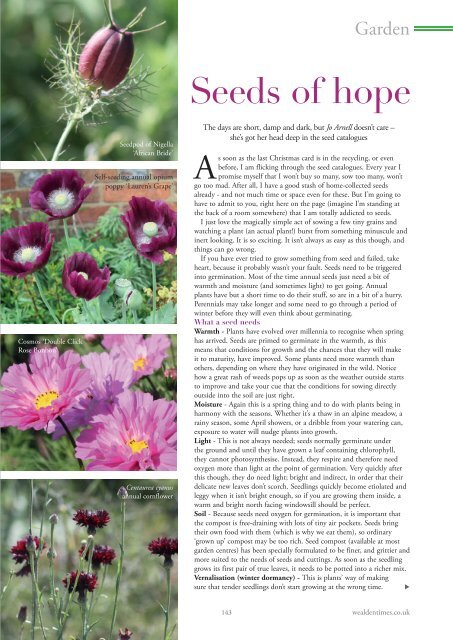Wealden Times | WT203 | January 2019 | Interiors supplement inside
Wealden Times - The lifestyle magazine for the Weald
Wealden Times - The lifestyle magazine for the Weald
Create successful ePaper yourself
Turn your PDF publications into a flip-book with our unique Google optimized e-Paper software.
Garden<br />
Seeds of hope<br />
Cosmos ‘Double Click<br />
Rose Bonbon’<br />
Seedpod of Nigella<br />
‘African Bride’<br />
Self-seeding annual opium<br />
poppy ‘Lauren’s Grape’<br />
Centaurea cyanus<br />
annual cornflower<br />
The days are short, damp and dark, but Jo Arnell doesn’t care –<br />
she’s got her head deep in the seed catalogues<br />
As soon as the last Christmas card is in the recycling, or even<br />
before, I am flicking through the seed catalogues. Every year I<br />
promise myself that I won’t buy so many, sow too many, won’t<br />
go too mad. After all, I have a good stash of home-collected seeds<br />
already - and not much time or space even for these. But I’m going to<br />
have to admit to you, right here on the page (imagine I’m standing at<br />
the back of a room somewhere) that I am totally addicted to seeds.<br />
I just love the magically simple act of sowing a few tiny grains and<br />
watching a plant (an actual plant!) burst from something minuscule and<br />
inert looking. It is so exciting. It isn’t always as easy as this though, and<br />
things can go wrong.<br />
If you have ever tried to grow something from seed and failed, take<br />
heart, because it probably wasn’t your fault. Seeds need to be triggered<br />
into germination. Most of the time annual seeds just need a bit of<br />
warmth and moisture (and sometimes light) to get going. Annual<br />
plants have but a short time to do their stuff, so are in a bit of a hurry.<br />
Perennials may take longer and some need to go through a period of<br />
winter before they will even think about germinating.<br />
What a seed needs<br />
Warmth - Plants have evolved over millennia to recognise when spring<br />
has arrived. Seeds are primed to germinate in the warmth, as this<br />
means that conditions for growth and the chances that they will make<br />
it to maturity, have improved. Some plants need more warmth than<br />
others, depending on where they have originated in the wild. Notice<br />
how a great rash of weeds pops up as soon as the weather outside starts<br />
to improve and take your cue that the conditions for sowing directly<br />
outside into the soil are just right.<br />
Moisture - Again this is a spring thing and to do with plants being in<br />
harmony with the seasons. Whether it’s a thaw in an alpine meadow, a<br />
rainy season, some April showers, or a dribble from your watering can,<br />
exposure to water will nudge plants into growth.<br />
Light - This is not always needed; seeds normally germinate under<br />
the ground and until they have grown a leaf containing chlorophyll,<br />
they cannot photosynthesise. Instead, they respire and therefore need<br />
oxygen more than light at the point of germination. Very quickly after<br />
this though, they do need light; bright and indirect, in order that their<br />
delicate new leaves don’t scorch. Seedlings quickly become etiolated and<br />
leggy when it isn’t bright enough, so if you are growing them <strong>inside</strong>, a<br />
warm and bright north facing windowsill should be perfect.<br />
Soil - Because seeds need oxygen for germination, it is important that<br />
the compost is free-draining with lots of tiny air pockets. Seeds bring<br />
their own food with them (which is why we eat them), so ordinary<br />
‘grown up’ compost may be too rich. Seed compost (available at most<br />
garden centres) has been specially formulated to be finer, and grittier and<br />
more suited to the needs of seeds and cuttings. As soon as the seedling<br />
grows its first pair of true leaves, it needs to be potted into a richer mix.<br />
Vernalisation (winter dormancy) - This is plants’ way of making<br />
sure that tender seedlings don’t start growing at the wrong time. <br />
143 wealdentimes.co.uk


















